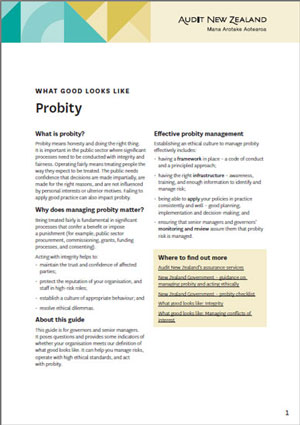What good looks like: Probity
This is part of our series on What good looks like, produced by our Specialist Audit and Assurance Services team.
 What is probity?
What is probity?
Probity means honesty and doing the right thing. It is important in the public sector where significant processes need to be conducted with integrity and fairness. Operating fairly means treating people the way they expect to be treated. The public needs confidence that decisions are made impartially, are made for the right reasons, and are not influenced by personal interests or ulterior motives. Failing to apply good practice can also impact probity.
Why does managing probity matter?
Being treated fairly is fundamental in significant processes that confer a benefit or impose a punishment (for example, public sector procurement, commissioning, grants, funding processes, and consenting).
Acting with integrity helps to:
- maintain the trust and confidence of affected parties;
- protect the reputation of your organisation, and staff in high-risk roles;
- establish a culture of appropriate behaviour; and
- resolve ethical dilemmas.
About this guide
This guide is for governors and senior managers. It poses questions and provides some indicators of whether your organisation meets our definition of what good looks like. It can help you manage risks, operate with high ethical standards, and act
with probity.
Effective probity management
- Establishing an ethical culture to manage probity effectively includes:
- having a framework in place – a code of conduct and a principled approach;
- having the right infrastructure – awareness, training, and enough information to identify and manage risk;
- being able to apply your policies in practice consistently and well – good planning, implementation and decision-making; and
- ensuring that senior managers and governors’ monitoring and review assure them that probity risk is managed.
Where to find out more
Audit New Zealand’s assurance services
New Zealand Government – guidance on managing probity and acting ethically
New Zealand Government – probity checklist
What good looks like: Integrity
What good looks like: Managing conflicts of interest
| 10 questions | Indicators of what good looks like | |
|---|---|---|
| Framework | 1. Is there a code of conduct that guides ethical behaviour? |
|
| 2. Is your probity framework up to date and consistent with good practice? |
|
|
| Infrastructure | 3. Is there good awareness, training, and guidance? |
|
| 4. Do you have information to help plan and manage the probity of high-risk processes? |
|
|
| Application | 5. Are processes well planned, with probity risks specifically identified and managed? |
|
| 6. Are risks from gifts, hospitality, conflicts of interest, confidentiality, and contact identified and managed? |
|
|
| 7. Are significant processes robust? |
|
|
| 8. Is your decision-making well informed and documented? |
|
|
| Monitor and review | 9. Do you review your approach? What have you learned? |
|
| 10. Are governors informed enough to assess whether probity risks are well managed? |
|
|
1: Ministry of Business, Innovation, and Employment, Government Procurement Rules.
2: Office of the Auditor-General, Managing conflicts of interest: A guide for the public sector.
3: Ministry of Business, Innovation, and Employment, Managing probity and acting ethically.
Page created: 8 November 2022
